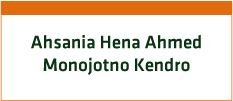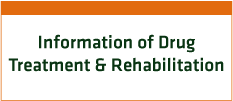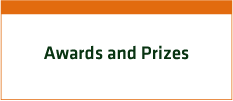Ahsania Mission Drug Treatment & Rehabilitation center, Jashore.
Background
Drug addiction and drug dependence are among the major social problems in the world. More people, both male and female, are becoming dependent on drug and other substances these days. Bangladesh is also facing the same problems lately as it has been observed that substance abuse rate is getting higher among every socio-economic levels.
Dhaka Ahsania Mission (DAM) has been working against drug addiction since its beginning. One of the major steps it took is establishing “Ahsania Madokota Protirodh o Niontron Karmoshuchi” or Drug Prevention and Control Program (AMIK in Bengali) in February 1990. The name was altered to AMIC: Addiction Management and Integrated Care in 2004. This has become one of the most remarkable flagships of DAM.
AMIC has been working to increase the knowledge and consciousness against drug addiction. Its activities have spread to Dhaka, Chittagong, Rajshahi, Jashore and Satkhira district by establishing detoxification camps for short time treatment of substance abuse disorders. DAM policy makers eventually realized that short-term treatment alone is not adequate for helping the dependents come out of addiction and other related problems. AMIC started its first Drug Treatment and Rehabilitation Center in Gazipur district in 2004. Considering the importance of services provided to the drug dependent population to prevent drug abuse, DAM further expanded its activities by starting the Jashore Drug Treatment and Rehabilitation Center on 26 July 2010.
Situation and Infra-structure
The center is situated at Boro Vekutia village under Arabpur Union of Jashore Sadar Upazilla. It runs its functions in its own 5-storeyed building on nine acres of field. AMIC-Jashore has a wonderful natural environment for being near Muktosshori river, getting abundant fresh air and scenic beauty.
Accommodation Capacity and Target Population
The center can accommodate 70-75 male patients from 16-50 years age group at the same time. It has been providing its services to the drug dependents without any deviation for religion, color, financial or social conditions. However the treatment plan is different for the patients under 16 years and for patients over 50 years. It is a residential program for six months with first 15 days for detoxification.
Center Setup
The center has the following amenities in its 5-storied, 16,400 square feet area of the building –
| Floor | Amenities | All of these accommodation systems are active. With all of these accommodations system there is suitable place for Wadu. |
|---|---|---|
| First Floor |
|
|
| Second Floor |
|
|
| Third Floor |
|
|
| Fourth Floor |
|
|
| Fifth Floor |
|
The center has been equipped with everything necessary for the clients and the staff. Adequate furniture, bedspreads, electric generator, and supplies for emergency management are present there. Several medical instruments and supporting services are always kept ready to battle any medical emergencies at any time. Provision of healthy entertainment such as television, carom board, ludo, chess, football, cricket, badminton, volleyball etc are present at the center. AMIC center is fully smoked free and controlled with C.C camera.
Treatment Methods
Treatment and rehabilitation program of the center is designed following the Therapeutic Community (TC) approach. According to needs of the patients, AMIC-Jashore provides physical and mental treatment. Patients are inspired to obey their religious functions as a part of the treatment. The treatment program also follows the 12 steps of Narcotics Anonymous (NA) support group.
The center provides six month long residential treatment that starts with first 14 days for detoxification phase. It is a process of clearing the substances and their toxic forms from the body. DAM is following evidence-based medical detoxification to safely manage the acute physical symptoms of withdrawal. During pre-treatment phase clients go through detailed medical and psychological screening, symptomatic withdrawal management, assessment and physical treatments. Treatment phase started after detoxification program. This is followed by 166 days rehabilitation program. During this time center provides mental health services, physical treatment, counseling, psychosocial education, individual and group therapy etc. Counselors, present at the centers, enhances client motivation with the psychological support to face the challenges at every stage in living a drug-free life. Client families are also offered to join family counseling sessions. Provision of psychosocial education is also an important part of the treatment. Clients receive information on harmful effects of drugs, HIV/AIDS, tuberculosis and other infectious diseases, overdose, life skill education, stress management, anger management etc. As the after care service, clients are offered to attend anti drug program, social program organize by center, annual recovery get-together program, outdoor counseling, family therapy, psychiatric treatment and group counseling after completing the course of the treatment. DAM is following treatment approach as appropriate to the individual’s age, sex, ethnicity and culture.
Moreover, DAM is conducting pre-admission screening performed by the trained staff to assess the physical condition of clients before admission, to rule out the risk of communicable diseases and any potentially life-threatening diseases which would require immediate secondary or tertiary hospitalization.
Case Management Services
DAM introduced case management approach during in-patient detoxification and treatment. Case manager helps to meet immediate, pressing needs that can interfere with treatment engagement. Having these needs met early in the process motivates the clients to engage in the program and increases their trust and belief that program staff members are listening and trying to help.
Family Involvement
Family plays an important role for the treatment of drug dependent individuals. Sometimes there are few factors within the families that drive the patient toward the life of darkness. Considering these facts, AMIC-Jashore insists on involving the families in the treatment process. Family counseling is also included in the treatment program when necessary. The center arranges family day on every Saturday when patients can meet their respective families. Family meeting is arranged in every month to disseminate the knowledge on drug addiction and its treatment.
Other Activities
The following activities are conducted by the AMIC-Jashore center that play a very significant role in the treatment and rehabilitation process for the drug dependent individual.
Outreach Programs
- Dissemination of information about drug dependency and its treatment.
- Outdoor personal counseling
- Family counseling
- Mental and social teaching about drug addiction and its treatment.
- Arranging awareness programs on the effects of drug addiction at educational institutions
- Working alongside various social organizations to keep the society drug free
- Distributing leaflets and stickers with anti-drug messages
In-house Programs
- In-house Programs
- Case Management
- Provision of mental and psychosocial education
- Counseling – personal, group, couple and family counseling sessions
- Psycho therapy
- Life Skill session
- Motivation session
- TC activities
- Physical and psychological treatment
- Referral System
- Family meetings, mental and social education to the family
Follow-Up Services for Continuation of the Care
- Patients can seek counseling services when necessary even after the treatment finishes
- Patients can stay in the center for 3 days in a month without any cost after completion of the treatment
- NA group meetings are held every month
- Patients are asked to maintain the follow up schedule strictly after completing the program
- AMIC arranges Annual Recovery Fare every year
Achievements
The center has been providing support to the substance abusers in a very skilled way and all the staff members are very dedicated for the well-being of the patients. The following traits have made the center very unique and remarkable in the field of working for treatment and rehabilitating substance abusers –
- Number of patients the center has dealt with: 644*
- Recovered patients: 310*
- Current patient number: 50
- Patient for review: 80
- The rate of drop out patients is very low
- Center plays active role in all awareness raising programs
- Center activities are planned with a view to providing the best support services to the patients, both in their good and bad times
- AMIC-Jashore cultivates vegetables and fish at the center and it has become an inspiration to the patients
- Good rapport with other institutions working in the field
- Provision of arranging jobs for the patients, if necessary
- AMIC-Jashore organizes Annual Recovery Fair where recovered patients and their family members can join to share their experience in fighting the battle against substance abuse
*Varies with time.
National and International Recognition
1. Dhaka Ahsania Mission was awarded with the 1st prize for drug addiction treatment and rehabilitation program from the Department of Narcotic Control of Ministry of Home Affairs on 26 June 2014.
2. Dhaka Ahsania Mission won the first prize for its outstanding contribution in the field of drug prevention by the DNC of Ministry of Home Affairs on on 26 July 2017 marking the International Day against Drug Abuse and Illicit Trafficking.
Case Study-1
I am Md. Rinku from Sujolpur under Vekutia of Jashore. I have a brother & a sister and I am the eldest of them. My father’s dream was to make me an educated and successful person. He always inspired me to do well in school. I had a romantic relationship with a girl when I was 13-14 years old and a student of class VIII. I had both good and bad experiences from my relationship. Sometimes my family & her family pressurized us for our relationship which hurt me a lot.
One day her family sent her to her uncle’s home at Faridpur, which became very painful for me. I had some elder friends, who offered me some things one day saying that it would decrease my pain and bring me some happiness.
I started my addiction life with weed to remove my pain. Although my first experience was bad, but eventually I started to like it and I got addicted to it. If I did not take weed at my usual time, I used to feel very bad. I also started taking Phensidyl. I quit school at that time. I did not have enough money to support my addiction, so I started having fights with my family very frequently. I got involved in anti-social works. All these made my family very unhappy and worried about me.
At one point, my father took me to his furniture shop, hoping that being busy would help me to quit using drugs. However, I used to become very violent and unstable when I had my cravings, and no one could keep me in the shop. By that time, I started using multiple substances such as alcohol, heroine and sometimes TDGSK injections along with my weed and Phensidyl addiction. Sometimes I overdosed on those and became unconscious. My life was at the end.
One day, my family beat me for fighting with them for money. My eyes were hurt severely. My father came to know that there is an addiction management center named Ahsania Mission Drug Treatment & Rehabilitation center. He admitted me into the center on 30 January 2015. Treatment for my addiction problem and injured eye was progressing simultaneously. I started realizing my faults and sins. After completing my treatment, I went back to my home and I started spending quality with my family, especially with my father. I started to feel real happiness. I used to contact the center if I felt bad or I had any problems for their feedback. I was fortunate to getting a job in Bangladesh army in 2016. My life is going well now. I have got married in 2017 and I am trying to living up to my family’s expectations as I have become the head of the family after my father’s untimely accidental death.
I am thankful to Dhaka Ahsania Mission for showing me the way to lead a drug free happy life.
Case Study-2
I am Md. Mostofa Ehsan Shahid, and I am 38 years old. I am from Andulia, Chaugasa, Jashore. But I currently live in Faridpur. We are four brothers and one sister. My father is a teacher and my mother is a housewife. Among the siblings, I am the second. After passing my SSC examination, I got admitted in Shaheen College, Jashore. I was an attentive and well performed student. I had very good relations with my friends at the college. I always tried to help them when they needed it.
From personal curiosity and my friends’ influence, I became familiar with drugs. I felt very embarrassed the first time, but I started to feel good with time. I got addicted to drugs. My family used to trust me unconditionally when I was at my college. I had the complete freedom to live my life on my terms. And I had become an immoral person by spending so much money in buying drugs. I misused the trust my family had blessed me with. I also started to collect money from other places.
I passed my HSC examination but I was having difficulties for getting into the undergraduate program. My family started to notice my monetary greed at that time. Despite their warnings, I started borrowing money from my relatives. I was getting bad reputation. I was a jobless person solely depending on my family. I passed my BA course with much difficulties. I couldn’t get away from my addictions even after that. I became the biggest and most difficult problem for my family. My family decided to arrange a job for me and they wanted me to get married.
I got a job in a sugar factory in Faridpur. But the condition was to marry a girl whom I didn’t like. Everybody assumed that this would bring me economic stability, but I was getting very depressed. I started taking more drugs. It became necessary for me to use drugs to perform my professional activities. I fathered a child, and that brought me even more responsibilities. With very severe stress in both personal and professional life, I started using more and more drugs each day. Six years of my life had passed in this way. But I couldn’t take the stress anymore and I confessed to my family.
My family was very supportive and they started looking for options for my treatment. They came to know about Ahsania Mission Drug Treatment & Rehabilitation center, and they decided to admit me in there. After discussing with my family members and reflecting on my life, I came to the center on 5 August 2014 to get admitted. I didn’t know about the treatment program at the beginning. Eventually I started to realize the objectives of the treatment program and I was inspired that I could really be free of any drugs if I followed the treatment protocols. I completed the full 6-month residential treatment. I also completed my graduation on 5 February 2015.
My recovery journey has been for more than three years now. I tried to reduce the distance that was between me and my family. Now my family members and other relatives believe me more than they did at previous years. I also get proper respect at my workplace. I have daughter now and I can see my family as a happy one. I am very grateful to Allah and the Ahsania Mission Drug Treatment & Rehabilitation Center – Jashore with all of its staff.
Case Study -3
I am Mohiminul Alom, 27 years old. I live in Sioulkupa Upazilla in Jhinaidaha district. My father is a government employee and my mother is a housewife. I am the only son they have. We were a solvent and happy family. My parent’s dream was that I would be government employee like my father one day. I was a good student and I was doing well in my studies.
I started taking sleeping pills out of my own curiosity and the influence of some of my friends. But I was getting familiar with every kinds of drugs with time. I got distant from my family members. I started borrowing money from my friends and relatives for drugs. I was losing my social acceptance. It became impossible to continue my studies at that point. After the HSC examination, I had become physically and mentally sick. I was the reason for unhappiness for my family.
My family came to know that Dhaka Ahsania Mission has an Addiction Management and Integrated Care (AMIC) Center at Jashore. They decided to admit me there for my treatment. I was taken there on 26 June 2010 as the first client. I completed my program there and I started believing that I would be able to lead a happy life.
My social rehabilitation program was planned following the rehabilitation treatment policy. With my recovered self-confidence and the achieved life-lessons from the rehabilitation program, I became a successful recovery case. My family started to get happy with me seeing the positive changes. They inspired me to start a business. I started my new life with starting a business of auto rickshaw accessories. I became self-dependent. I am leading a happy life now with my father and mother. I have a respectable social acceptance. I am working for raising awareness against addiction among the young generation.
I am very grateful for Ahsania Mission Addiction Management and Integrated Care (AMIC) Center – Jashore for my new life.






